|
|
|
Sort Order |
|
|
|
Items / Page
|
|
|
|
|
|
|
| Srl | Item |
| 1 |
ID:
174031
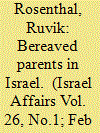

|
|
|
|
|
| Summary/Abstract |
This article explores the changing voice of bereaved parents in Israel from 1948 to the present. Until the early 1980s, bereaved parents did not express their grief or protest publicly. Their bereavement was a strictly private matter. In 1982, shortly after the outbreak of the First Lebanon War, their grief and protest burst into the public sphere. From then on, their voice gained momentum and legitimacy and in time directly impacted the political decision-makers. The article defines four phases in the changing content, tone and style of parental bereavement – hidden, political, privatized, and moral – by analyzing and comparing six representative texts.
|
|
|
|
|
|
|
|
|
|
|
|
|
|
|
|
| 2 |
ID:
089414


|
|
|
|
|
| Publication |
2009.
|
| Summary/Abstract |
Bangladesh's parliamentary elections in December 2008 witnessed a landslide victory for an alliance led by Sheikh Hasina's Awami League following two years of a caretaker government backed by the military. The country's beleaguered population faced the twin challenges of natural disasters and pervasive poverty. One of the key factors influencing trust in the government of Bangladesh is stability, which has been in short supply because of confrontational politics between the two largest parties and accompanying violence. This paper considers efforts to rebuild trust by examining the work of a social movement, Transparency International Bangladesh (TIB), at two levels: strengthening the pillars of the national integrity system (with a specific focus on parliament), and holding public bodies to account for corrupt practice in delivering key services. People's experiences of services delivered through schools, hospitals and local government have resulted in a complete collapse in trust in public bodies. The commitment of the democratically elected government to tackle corruption at all levels will be a key determinant of whether trust and stability can emerge from the volatility of Bangladesh's politics.
|
|
|
|
|
|
|
|
|
|
|
|
|
|
|
|
| 3 |
ID:
158912
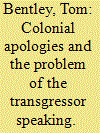

|
|
|
|
|
| Summary/Abstract |
Can state apologies help reconciliation between former coloniser and colonised? Much of the literature on political apologies is optimistic regarding their potential to aid reconciliation. Even critical work frequently dispraises particular case studies, while maintaining a normative commitment to apology. Building on a growing postcolonial literature on the subject, this article contributes a more fundamental critique of colonial apology. It argues that its inherent structure entails a format that accords the politician of the transgressor state an elevated speaking position. This results in the ritual being predisposed to problematic representations of the colonised and sanitised narratives of the transgression. The argument is situated within Edward Said’s considerations on representation in the colonial process.
|
|
|
|
|
|
|
|
|
|
|
|
|
|
|
|
| 4 |
ID:
115256
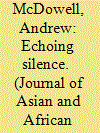

|
|
|
|
|
| Publication |
2012.
|
| Summary/Abstract |
I examine the conceptual trajectory of 'backwardness' in policy, politics and rural life to understand the term's many uses in India. I examine links forged between backwardness and governance in colonial and post-colonial commissions and committees charged with assessing and affecting Indian democracy. Multiple commissions add confusion and ambiguity, setting a variable tone of backwardness in contemporary policies, citizens' experience and claims-making. I examine the multiple voices that backwardness fosters and silences, engaging debates about mass politics, subjectivity, development and governance.
|
|
|
|
|
|
|
|
|
|
|
|
|
|
|
|
| 5 |
ID:
168482
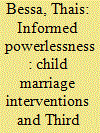

|
|
|
|
|
| Summary/Abstract |
Child marriage has gained increased international prominence over the past decades. Organisations working with the issue have promoted empowering girls as the best strategy to address it. Informed by postcolonial feminist theory, this article will locate these discourses in broader ‘turn to the girl’ and ‘turn to agency’ in international development, analysing how Third World girlhood, agency, resistance and voice are conceptualised. Girls are constructed as threatened by their families and communities, with agency exercised through resistance and materialised by their voice. I argue that this ignores the complexity of decision-making processes and broader structural factors related to child marriage, so that interventions providing ‘empowerment-as-information’ for girls to be agents of change instead leave them in a state of informed powerlessness.
|
|
|
|
|
|
|
|
|
|
|
|
|
|
|
|
| 6 |
ID:
170474
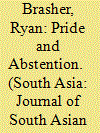

|
|
|
|
|
| Summary/Abstract |
Little research has been done on political dynamics within the Christian community in Pakistan itself, a lacuna I begin to address through survey research among Christian and Muslim students in Lahore. I ground this study in a detailed discussion of the existing literature on Pakistan, and comparative political research on national attachment of minorities elsewhere. I am particularly interested in assessing to what extent Christian students in Lahore have a strong sense of belonging and connection to the national community or feel marginalised from it. In fact, I find that Christians do have a strong sense of connection to their Pakistani identity, but are more inclined toward military rule and less interested in and knowledgeable about politics than their Muslim counterparts. Intra-Christian differences based on income level and denomination are apparent as well: Christian students from wealthier backgrounds have higher levels of political interest and knowledge, whereas poorer students and those affiliated with Pentecostal denominations have less political engagement but higher levels of nationalism.
|
|
|
|
|
|
|
|
|
|
|
|
|
|
|
|
| 7 |
ID:
175519
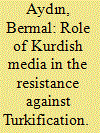

|
|
|
|
|
| Summary/Abstract |
Kurds are the largest minority group in Turkey and their position is one of conflict with the ‘Turkishness Contract,’ a concept that describes the unspoken convention ensuring the ethnic privilege of Sunni-Turks and the exclusion or assimilation of those who resist Turkification. Kurds have thus experienced oppression since late Ottoman times and throughout the Republican years, up to the present day. This article suggests that the Kurdish media in Turkey have always had to negotiate state oppression by articulating a strategy of resistance to the hegemonic knowledge imposed by the state and reproduced by the mainstream media. They thus reject the Turkification that would be required to abide by the Turkishness Contract. This article's investigation of the Kurdish media takes place through an exploration of an online news platform, a self-proclaimed ‘voice of the weak.’ The data were collected through semi-structured in-depth interviews with journalists and editors of the platform.
|
|
|
|
|
|
|
|
|
|
|
|
|
|
|
|
| 8 |
ID:
093856
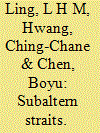

|
|
|
|
|
| Publication |
2010.
|
| Summary/Abstract |
Mainstream approaches perpetuate the Taiwan-China 'crisis'. They do so by following Cold-War concepts and prescriptions, despite the rise of new realities and new visions for cross-strait relations. We draw on Hirschman's identification of 'loyalty' and 'voice' to describe the mainstream discourse on cross-strait relations in Taiwan, mostly directed by the United States. But a third option is now emerging. It offers the possibility of a paradigmatic breakthrough or 'exit' based on articulations of a postcolonial subjectivity for Taiwan and its relations with China.
|
|
|
|
|
|
|
|
|
|
|
|
|
|
|
|
| 9 |
ID:
146935
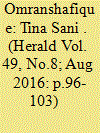

|
|
|
| 10 |
ID:
164991
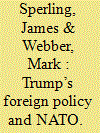

|
|
|
|
|
| Summary/Abstract |
Donald Trump assumed office in January 2017, committed to revamping US foreign policy and putting ‘America First’. The clear implication was that long-held international commitments would be sidelined where, in Trump’s view, the American interest was not being served. NATO, in the crosshairs of this approach, has managed to ride out much of the criticism Trump has levelled against it. Written off as ‘obsolete’ by the American president, it has fared better in the Trump era than many commentators had predicted. NATO exemplifies a tendency in US foreign policy, which pre-dates Trump, where open criticism stops short of abandonment. This pattern has continued since 2017 and indicates a preference for voice over exit. As such, it suggests that Trump’s foreign policy is not always as illogical as many have assumed. Logic is borne of institutional context: Trump has chosen to articulate voice where institutionalisation makes exit unviable. Institutional resilience in general and NATO’s case specifically has a wider relevance, both for transatlantic relations and international order.
|
|
|
|
|
|
|
|
|
|
|
|
|
|
|
|
| 11 |
ID:
103387
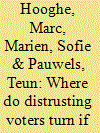

|
|
|
|
|
| Publication |
2011.
|
| Summary/Abstract |
It has been suggested that political distrust is associated with lower levels of voter turnout and increased votes for challenger or populist parties. We investigate the relationship between political (dis)trust and electoral behaviour using the 2009 Belgian Election Study. Belgium presents an interesting case because compulsory voting (with an accompanying turnout rate of 90.4 per cent) compels distrusting voters to participate in elections. Nevertheless, distrusting voters are significantly more inclined to cast a blank or invalid vote. Second, distrust is positively associated with a preference for extreme right (Vlaams Belang) and populist (Lijst Dedecker) parties. Third, in party systems where there is no supply of viable challengers (i.e. the French-speaking region of Belgium), the effect of political trust on party preference is limited. We conclude that electoral effects of political distrust are determined by the electoral and party system and the supply of electoral protest.
|
|
|
|
|
|
|
|
|
|
|
|
|
|
|
|
|
|
|
|
|